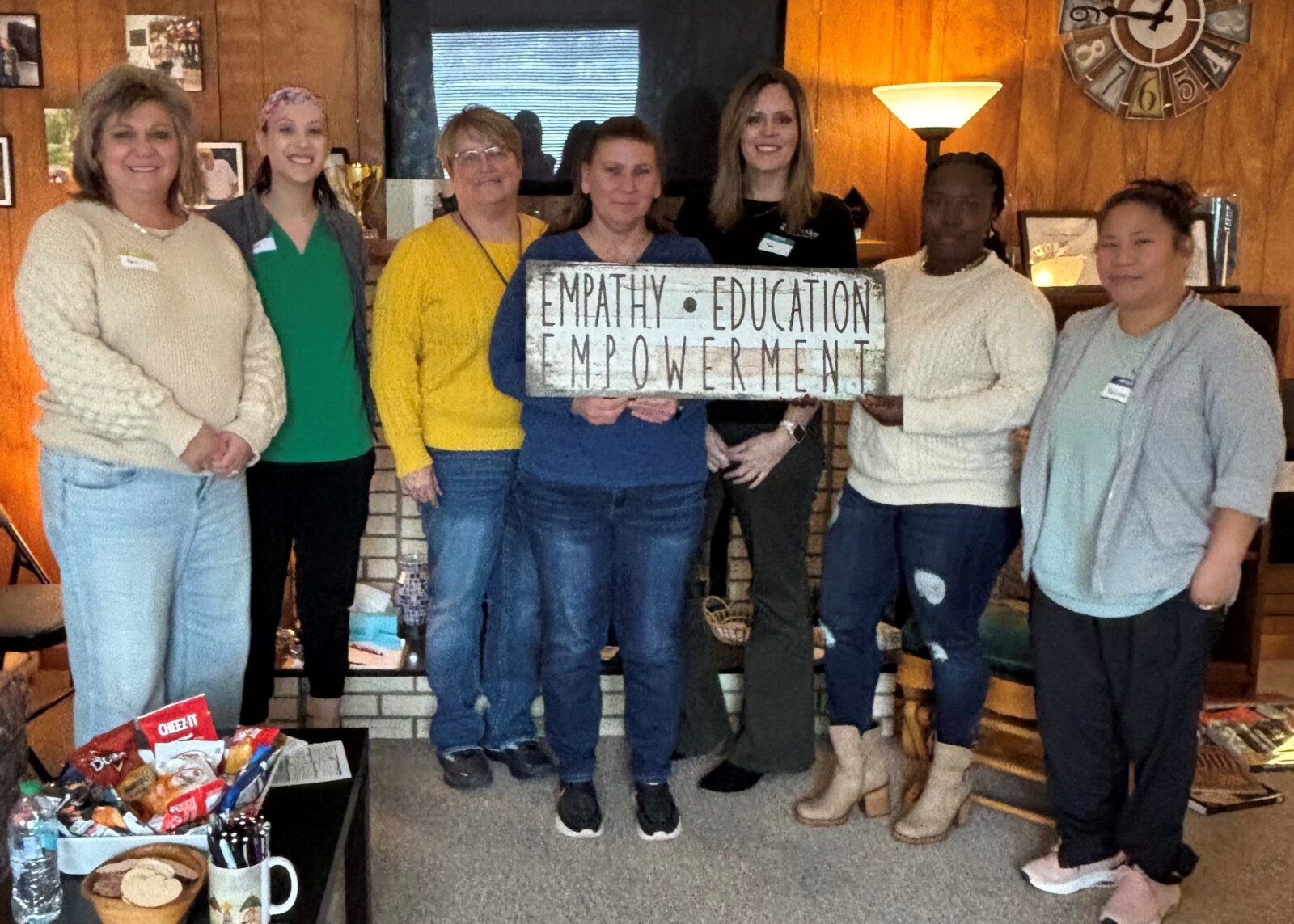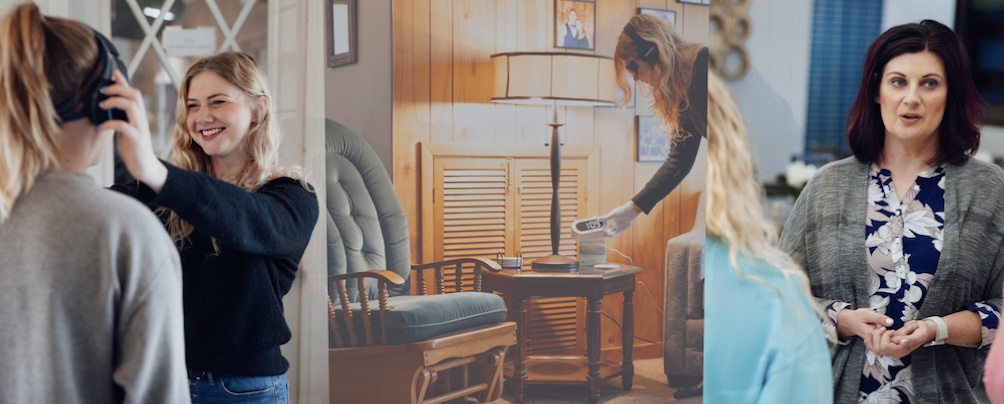Submitted by: Amy Schultz, Administrator Gracewell and Kara Webb, Assisted Living Director
A group from the Eventide campus took the 3-hour drive to the University of Northern Iowa campus in Cedar Falls to experience the Dementia Simulation house in January. The house appears to be a normal functioning house from the outside but on the inside, it is an educational experience. According to Professor of Gerontology, Elaine Eshbaugh, 80% of people living with dementia live at home in the community making the residential setting of this simulation very intentional and more realistic for the learner.

Those who attended include Amy Schultz, Administrator Gracewell; Katie Putnam, Life Enrichment Coordinator Gracewell; Doreen Adams, Director of Nursing Gracewell; Kathy Segebart, CNA Gracewell; Kara Webb, Assisted Living Director Silveridge; Hawa Sesay, CNA Gracewell; and Manivone Villalovos, CNA Gracewell. Hawa, Kathy and Manivone spend many of their working hours in our Memory Lane household.
Kathy Segebart, CNA for Gracewell shared, “The experience was very interesting. It was an eye-opener to see how a person with dementia lives in the real world. Other people should experience this to get an understanding. It was well worth the trip.”
We started the process by learning the 3 takeaways that they wanted us to grasp throughout the experience: Empathy, Education, and Empowerment.
Upon entering the Simulation House, we were given cotton gloves to wear on our hands, earphones with constant and varying noise, and dark glasses to obstruct our vision. Why were we given these things? We were encouraged to think of dementia not only as memory loss, but more so as ‘brain failure’, as it affects so much more than just memory. We were then each verbally given 4 different instructions we were to complete in the house. The instructions were brief and somewhat vague, such as ‘Groom Fluffy’, ‘Set up your medications for the day’, ‘Wipe the counter’, ‘Put away your shoes’, ‘Button and hang up the shirt’, etc.
Now those may seem like simple instructions, however, keep in mind we had never set foot in the home before. We would also been disabled by the sensory tools which made it very difficult to understand the instructions. The idea was for each of us to have to complete the assigned tasks in an unfamiliar place with the different sensory tools in place – similar to what a person with dementia experiences every day.
When the participants had completed their experience, we sat as a group and discussed how the experience made us feel and what we learned. We each had to write one word to describe what we felt during this experience. Some of our descriptive words were: crazy, overwhelmed, incapable, stressful, helpless, distracted and frustrated. If you think about it, these words are likely to describe how people living with dementia often feel as they try to navigate through their days.
The gloves challenged our dexterity similar to how dementia can cause muscle rigidity and changes in coordination and movement. It became difficult to do simple tasks such as plugging in a vacuum, holding a glass of water, opening and closing bottles, or buttoning the buttons on a shirt.
The background noises in the headphones were specifically challenging for participants. These sounds were a combination of people carrying on nearby conversations to everyday sounds one would hear in their environment such as a telephone ringing, the doorbell, a car horn honking, the television, etc. A brain without dementia can filter through the noises, and interpret whether its important data coming in or unimportant, and can filter out the unimportant. According to Dr. Eshbaugh, people living with dementia are unable to filter through the information they hear and the brain registers it all as important, therefore the unimportant sounds are unable to be filtered out. This can be very distracting, agitating and overwhelming. This is likely why people living with dementia have a difficult time in loud or stimulating environments, or why they have a difficult time processing tasks or instructions.
We learned it takes approximately 20 seconds for someone living with dementia to process one thought or instruction before they can move on to the next one because of how long it takes their brain to interpret information. For example, while Kara was attempting to complete one of her tasks she noticed a phone and doorbell ringing in her headphones which caused her to pause and question if was an important part of the simulation and she should stop what she was doing to answer the phone or the door, or if it was unimportant and she should continue trying to complete her task. This caused a delay in her task completion as she investigated the sounds.
Amy, on the other hand, did not notice a doorbell or phone ringing, but rather heard sirens and someone talking nonstop. All these distractions caused her to focus harder on what she was doing and made her less aware of her surroundings. If you think of someone living with dementia, like these examples, they likely have moments where they are easily distracted or, on the contrary, where they are so fixated on something that it is difficult to redirect.
We also discussed how the glasses really changed our perception and visual field, similar to how an individual experiencing aging and visual changes may have deficits they have to navigate through. Dementia typically causes our visual field to narrow, limiting our peripheral vision making it difficult for us to see things unless they are directly in front of us. Suddenly we were instilled with a fear of falling and found ourselves stumbling over things we did not realize were there, something that was very unfamiliar and unsettling to us.
There were so many takeaways from this experience!
Not only did it make us more empathetic by forcing us to live for a few moments in the shoes of someone living with dementia, but it also educated us to be better caregivers. A few key concepts we brought home:
- Never approach someone with dementia from the side, as this may startle their already uneasy state. Rather, talk to the person straight on and look them in the eye when talking with them.
- Only give one instruction at a time and let them process for 20 seconds before moving on with the discussion or further instructions. Their brains are unable to filter through information normally.
- Be very clear with your communication. Do not assume the person living with dementia knows what you mean or is always familiar with their environment.
- Just because we have ‘always done it this way’, does not mean we should always do it the same way. It is heartbreaking to think that maybe one day it might be best for mom or dad not to attend the big family Christmas gathering at the farm. But in reality, we constantly need to evaluate what is truly best for a person living with dementia as it is progressive and always changing. There may come a time when large gatherings are no longer the best environment for someone living with dementia and perhaps a quieter or smaller and more intimate gathering may be more appropriate. Even further, there may come a time when leaving the person with dementia at home or in the environment where they are most comfortable may be the best thing for them.
Eventide is a Dementia Friendly community, and Morgan Saunders, Social Worker at Gracewell is a certified Dementia Friend. She provides educational programs about dementia on campus and in the community, in addition, she leads the Alzheimer’s Support Group on the Eventide Campus. Give Morgan a call at (712) 263-3114 for dementia support, questions or resources.

